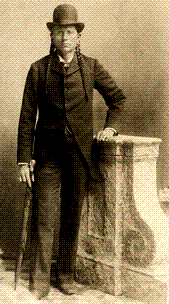Nadua, Cynthia Ann Parker
In December of 1860 the Texas Rangers made a surprise attack on 20 Comanche Indians who they believed had been raiding settlements in the area. As the Comanche fled, the Rangers cut them down. One woman carrying a baby was spared. Her name was Nadua. Her husband was Peta Nocona, a great Comanche chief, and her son was Quanah Parker, the last chief of the Comanche.
The relentless westward expansion of white settlers displaced, one by one, the Native American tribes from their homelands. Hundreds of tribes were crowded together onto land depleted of the game they depended on for survival. Relationships between tribal groups that had developed over centuries were disrupted, leading to wars among the tribes. An endless series of broken promises convinced the Indians that the word of the white man could not be trusted. Native Americans dealt with their dilemma in various ways: by trying to adopt the white man's ways, by trying to escape by moving further west, and by retaliation. The Comanche chose the latter.
During the 1830's the Comanche lead an effort to create an Indian alliance, as had the Shawnee chief Tecumseh and the Sauk chief Black Hawk. One of the leaders of this movement was Nadua's husband Peta Nocona. Peta was the son of another Comanche chief, Iron Jacket, of whom it was said he could blow bullets away with his breath.
In 1833, a white settler named John Parker brought his family down from Illinois to east Texas. He built a fort, made friends with some of the local Indian Tribes, and began farming. What he didn't realize was that he had settled in Comanche country. In 1836, a band of Comanche, led by Chief Nocona, attacked the Parker settlement. Five men were killed, and six women and children were taken hostage.
Among the hostages were Cynthia Ann Parker, age 9, and her brother John, age 5. Eventually all the hostages were ransomed except for Cynthia Ann, who was given the name Nadua, 'someone found,' in the Comanche language. Chief Nocona married Nadua, and they had three children together: two boys Quanah (Fragrance) and Pecos (Pecan), and a girl Topsanna (Prairie Flower). Nocona's affection for Nadua was so great that he never took another wife unlike most chiefs of his rank.
At the time of the 1860 attack on Chief Nocona's band, the chief and his son Quanah were away hunting. Sull Ross, commander of the Texas Ranger unit which massacred the little group of Comanches, claimed to have killed Chief Nocona. Ross made a lot of his victory over the little band of Comanches, claiming that it put an end to the "great Comanche confederacy." It earned him the notoriety that later got him elected Governor or Texas.
The other claim made by Ross was that he had rescued the long lost captive of the Comanche, Cynthia Ann Parker. Soon after Nadua's capture by Ross, one of his men noticed that her eyes were blue. After much questioning Ross managed to connect Nadua, who had forgotten how to speak English, with the Fort Parker massacre 25 years before. Nadua was returned to her white family, and when her uncle Isaac Parker mentioned that his niece Cythia had been captured by the Comanches, Nadua said: "me Cincee Ann." Although her family tried to make her feel at home, Nadua begged them to let her rejoin her Indian family, and she tried several times to escape. Four years after her capture, Nadua's daughter Prairie Flower died of pneumonia. After that Nadua stopped eating and soon she sickened and died.
Nadua's husband Nocona also died soon after his wife and daughter were captured. According to his son Quanah he died of injuries he had sustained years before in a battle with the Apache.
Quanah Parker lived until 1911. He had five wives and 25 children. After his father's death he became a great warrior and a great chief in his own right. He led the largest band of Comanche to remain free until in 1875, he was finally defeated at the Battle of Palo Duro Canyon. Soon after he and his his warriors surrendered and were forced to go to the Comanche reservation in southeastern Oklahoma where he was chosen chief over all the Comanche.
Once in Indian Territory, Quanah Parker adapted well to the white culture. He took his mother's surname of Parker, and became a successful rancher. He included among his friends Theodore Roosevelt. He rode in Roosevelt's inaugural parade and Roosevelt visited Parker at his home in Oklahoma where they went hunting together.
Quanah Parker was loyal to his Indian heritage. He helped found the Native American Church, an attempt to join together Christian and Indian traditions. Quanah was also loyal to his family. He became acquainted with his white family and before his death retrieved the remains of his mother and sister, and buried them near his home in Oklahoma.
Quanah Parker



No comments:
Post a Comment